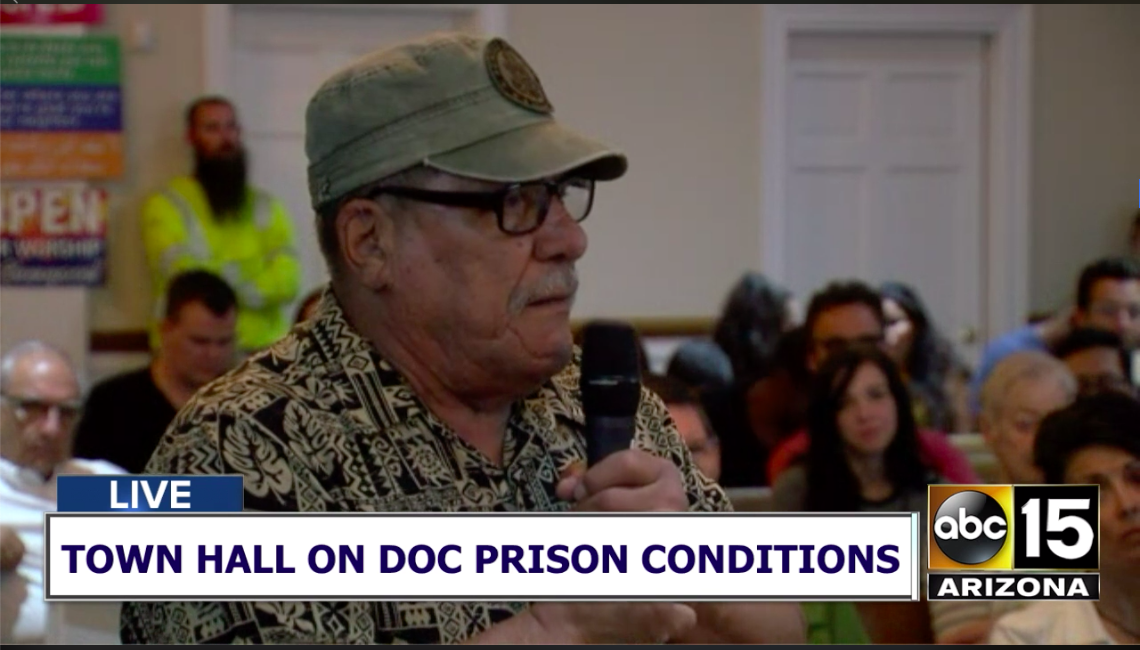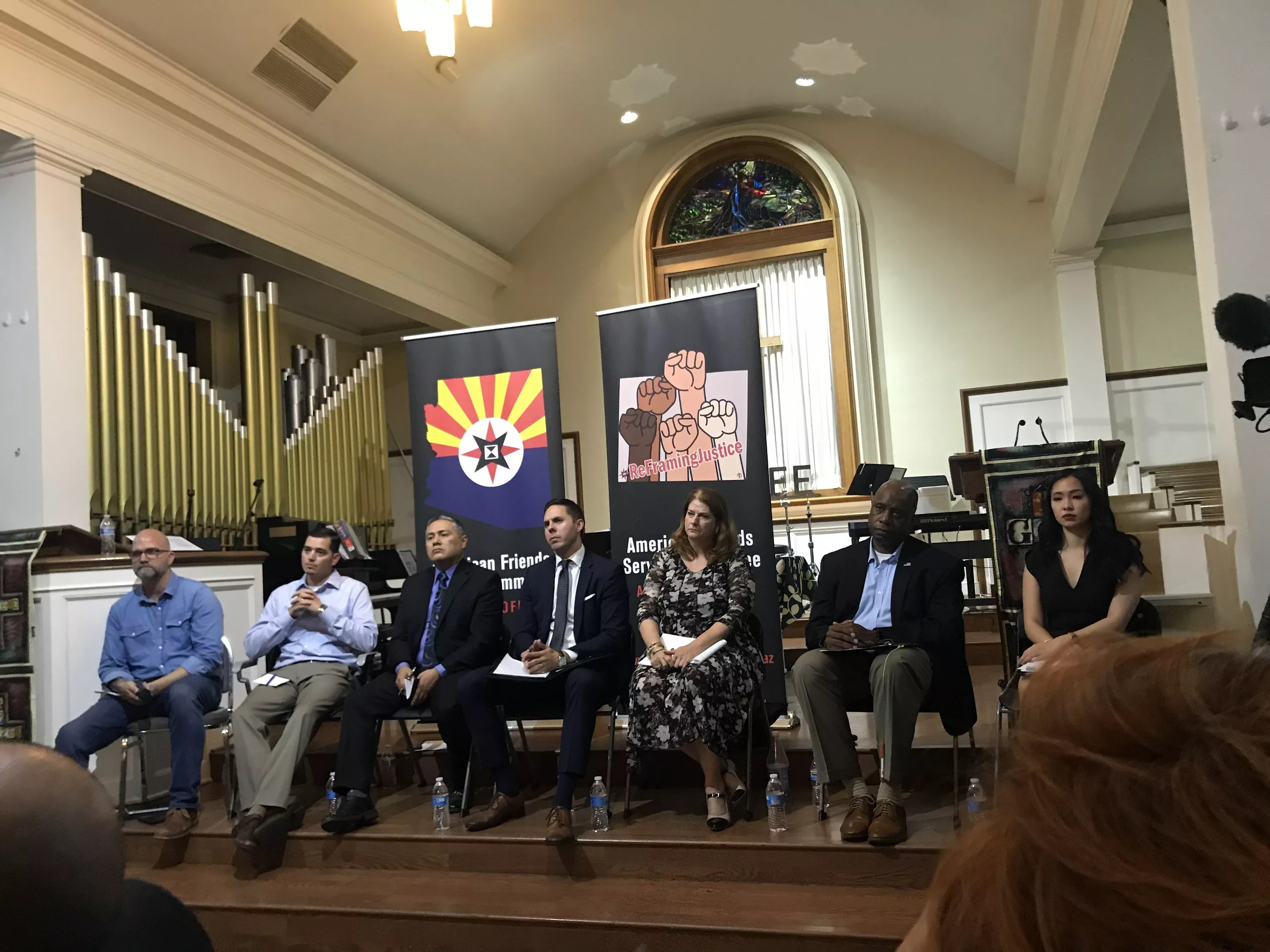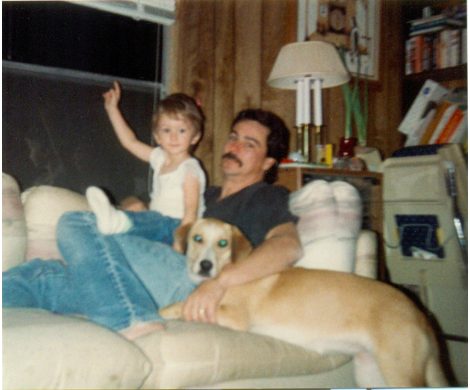
ABC15

Audio By Carbonatix
“My son is in [prison] for a drug addiction. They gave him 9.5 years. He is not a violent criminal,” Uriel Banuelos said, clutching a microphone in his shaking hand. “He was beaten into a coma the second night he was there … my son put in for protective custody, but they denied him … he’s in a vegetative state now.”
“When we went to the hospital, they did not let use see our son. He’s gonna die. And there’s nothing we can do,” Banuelos said before sitting back down in a pew next to his sobbing wife. His testimony on Wednesday evening left some in the packed Phoenix church in tears.
The town hall on state prison conditions at First UCC Church on North Second Street that night was full of stories like Banuelos’, reigniting calls to fire Chuck Ryan, head of Arizona’s Department of Corrections. The event, organized by the American Friends Service Committee of Arizona (AFSC), drew a crowd of roughly 200 people.
Tim Roemer, public safety policy advisor to Governor Doug Ducey, Karen Hellman, ADC director of inmate programs and re-entry, and State Representatives Diego Rodriguez and Walt Blackman sat at the front of the church listening to story after story of suffering and loss taking place inside of Arizona’s prisons.
Rodriguez promised to follow up with Banuelos and find a way to help his son. Rodriguez did not respond to a phone call and email the next day from Phoenix New Times in an attempt to follow up on Banuelos.

From left: Joe Watson, Danny Howe, representative Diego Rodriguez, Tim Roemer, Karen Hellman, representative Walt Blackman, and Laetitia Hua
Meg O’Connor
At least five people who spoke that evening said their son, nephew, brother, or friend had died in Arizona’s prisons.
“I lost my nephew Tony Lester nearly a decade ago to a highly preventable suicide,” said Patti Jones, her voice breaking as she recounted the painful events that followed his death. Lester, who was 26, had been diagnosed with severe schizophrenia. He was mistakenly issued razors just two days after being removed from suicide watch.
“When I got the call that my nephew had died, we were told he was taken to the hospital with non-life-threatening injuries,” Jones said. “Two hours later, we got the call that he had died. My sister called relentlessly to all local hospitals … nobody would tell her where her only child was.”
For the next two years, Jones and her sister struggled to get any answers about Lester’s death. Then, an investigative reporter with 12 News (KPNX-TV), Wendy Halloran, obtained a video of Lester’s final moments. The video shows correctional officers simply stood by and filmed Lester as he bled out in his cell, having slashed his throat and wrists with the razor blades.
“They stood by for 23 minutes without lifting a finger to perform basic first aid to him,” Jones told the church, her voice crackling with emotion. “Tony laid there gurgling, begging for someone to help him. They did nothing. Nothing.”
Jones and her sister filed a wrongful-death lawsuit to hold corrections officials for their actions, but the case dragged on for four years. Then, two weeks before trial, “Tony’s case was farmed out to a private law firm” who used “a legal tactic to force my sister, who had just gone through a kidney transplant, to settle out of court,” Jones said. “It was never about money. It was to have Tony’s voice heard in a court of law … Director Ryan needs to be fired. He’s had nine years to bring about change.”
Calls for Ducey to fire Ryan have mounted in recent months following a series of high-profile stories of grave mismanagement and inhumane treatment in Arizona’s prisons. Jones was only one of many in attendance Wednesday night who again demanded his removal.
In April, an investigation by ABC15 News found faulty doors at the Lewis state prison complex in Buckeye had endangered guards and led to the death of at least one incarcerated person. In May, KJZZ reported that pregnant women in Perryville prison have been forced to give birth and suffer miscarriages alone in their cells. In June, problems with Douglas prison’s water system – which Cochise County officials had long been aware of – left 2,000 people in the state prison complex without running water for more than four days.
“The consistent pattern of mismanagement, abuse, and neglect stems from an organizational culture of dehumanization and disregard for human rights,” reads a statement from AFSC, a criminal justice advocacy group that works to reduce mass incarceration and improve prison conditions, on a website launched just this morning called FireChuckRyan.org. “Corrections has the third largest state agency budget, totaling over $1.1 billion annually. But the serious problems in our prison system present an additional burden on taxpayers.” The website also notes that Arizona has spent millions settling wrongful-death lawsuits and a class-action lawsuit against negligent medical care in prisons.
Arizona has the fourth-highest incarceration rate in the country and some of the strictest sentencing laws, with over 42,000 people currently incarcerated in state prisons. Drug possession and distribution are some of the leading causes of incarceration in the state.
Danielle Jensen’s brother, Jeffrey, was among the thousands of people sent to prison in Arizona for drug addiction. He began a sentence of three years and nine months in 2014, but he never made it out.
“We went from making plans to help my brother reintegrate into society after serving his sentence to planning his funeral,” Jensen told the crowd at First UCC Church. “My brother was brutally assaulted in an uncontrolled and unsupervised area of the prison. He was beaten continuously without anyone to stop the assault.”
“A murder, in a state prison, unwitnessed by the officers that we’re paying to manage and control these prisons,” Jensen said. “The cameras don’t work. The locks don’t work. And frankly, the correctional officers don’t work. ADC is continually noncompliant with its own policies.”

Danielle Jensen speaking at First UCC Church
ABC15
No one was ever held accountable for Jeffrey Jensen’s murder. So in April, Jensen asked the governor for help. “Tim, I handed the letter to you,” Jensen said, addressing Ducey’s public safety adviser, Tim Roemer. “We asked our director, Chuck Ryan, to take action, yet another murder took place [this April].”
Tammy Early’s son, Neil Early, was also beaten and left for dead while incarcerated in Kingman, a private prison in Mohave County.
“My son was given a mandatory five-year sentence for stealing five video games,” Early said. “Six months before the riots, and nine months before the end of his sentence, he was assaulted and died from his injuries. He was 23 years old, and left a 4-year-old child behind.”

Neil Early and his father, Keith
Family Website
The lack of basic medical care in Arizona’s prisons was another significant concern on Wednesday night. Last year, a federal judge fined the corrections agency $1.4 million for failing to meet the terms of a settlement agreement that resulted from the 2012 Parsons v. Ryan lawsuit over prison health care. Earlier this year, ADC cut ties with Corizon, its private contractor for prison health care, after a KJZZ investigation found Corizon had instructed its employees to deliberately mislead government auditors.
At First UCC Church, Jason Odhner, a registered nurse, gave an impassioned speech about the malpractice by ADC doctors he has witnessed firsthand. “I am appalled by what I can only describe as gross medical negligence that in multiple cases led to death or organ failure,” said Odhner, who explained that he has seen some patients recently released from ADC care and is often horrified upon examining them.
“There is a lab value called an A1C. That doesn’t just test what your blood sugar is now, it tests what your blood sugar has been over the course of several months … This guy gets out of ADC care and within two days of being out his A1C when we test it is 13.8. That is state-fair, blue-ribbon, scary-gonna-kill-you uncontrolled blood sugar going back months and months under your care,” Odhner said, visibly angry.
“That is state fair, blue-ribbon, scary-gonna-kill-you uncontrolled blood sugar going back months and months under your care. He lost his kidneys under your care. You put him into organ failure.”
“This man was in kidney failure which was caused by uncontrolled blood glucose for months and months and months under your care,” Odhner continued. “He’s on dialysis today. I have baseline labs on him from before he was incarcerated, when his blood sugar was under control and his kidneys were fine. He lost his kidneys under your care because you are negligent and you put him into organ failure …There is no word for that other than malpractice. This is not some rare exotic disease … it’s diabetes! It is not that complicated. You control both his food and his medicine; how hard can this be?”
Odhner pointed out that there are often no signatures on the medical records he reviews, and no names on the medical paperwork, making it impossible to identify bad actors or hold people accountable when they provide negligent medical care.
“So they can kill people, put them into organ failure, and you have a right to those records, but it is a secret who killed your family members, and that is not how medicine is practiced anywhere else in the United States of America,” Odhner said, placing down the microphone as the room erupted with applause.
Odhner wasn’t the only one who had seen a lack of medical care inside Arizona prisons turn deadly. Sue Ellen Allen and Tuesday Brauer both had friends in Perryville prison who died. Allen’s 25-year-old cellmate, Gina, collapsed one day in prison. Two months later, she was dead. She had leukemia, but the prison had never administered a blood test, even when Gina said she felt ill, Allen said.
Brauer’s friend died of heatstroke and a lack of medical care. Stories of frequent power outages in Arizona’s prisons were one thing that caught the attention of Roemer, Ducey’s adviser, that evening.
Toward the end of the night, Roemer mentioned he was “unaware of some of the power outages mentioned … That is something we will be working on.” He also said he will look to get more drug-treatment counselors and mental health treatment in prisons and improve communications between prison employees and people whose loved ones are incarcerated.
Hellman, the ADC division director for inmate programs and re-entry, said the testimonies that evening also gave her some ideas for improvement, “including calendars in the yard so that inmates know when there are programs going on.” The idea was a nod to a man who questioned her earlier in the evening about when people are notified that they are eligible for re-entry programs.
In his closing remarks, Arizona Representative Walt Blackman, a Republican from Snowflake, stood and told the audience the stories he heard that evening had pierced his heart, and revealed that he has a loved one who is incarcerated in Texas. Blackman said he would take what he learned that night back to the Legislature and will begin ad hoc committee hearings on sentencing reform this upcoming Monday.
“I know that we are capable of doing better,” Jensen said earlier in the evening, pleading with the panel to examine models of how prisons are run in other states and take action to improve conditions in Arizona’s prisons. “Just imagine for a moment that our state becomes a new model, the best model, for how a correctional institution is run, where we could welcome a person returning from prison into your own community knowing that they are actually better from before they went in, not worse, and definitely, not on their deathbed.”